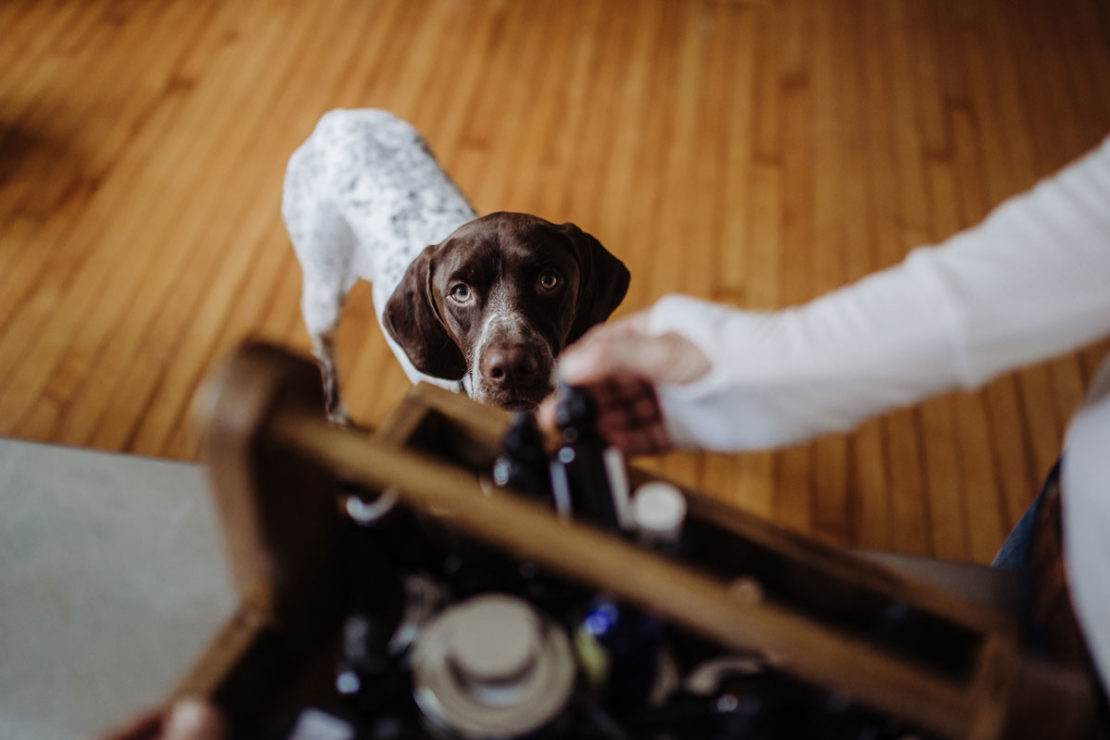
Calming Canine Herbs for Your Four-Legged Friends
There are a number of things that can cause stress and anxiety for our beloved pets, from separation anxiety to loud noises. Whenever my dog hears a loud bang that resembles a gunshot sound, his ears fold back, he gets as close to the ground as he can, and he frantically scrambles to hide. This happens quite often since we live in a city, so I have a few essential calming canine herbs on hand to help soothe his anxiety. In this post, we will learn about several calming herbs that are considered safe for dogs and different ways to use them.
Using Calming Canine Herbs Holistically
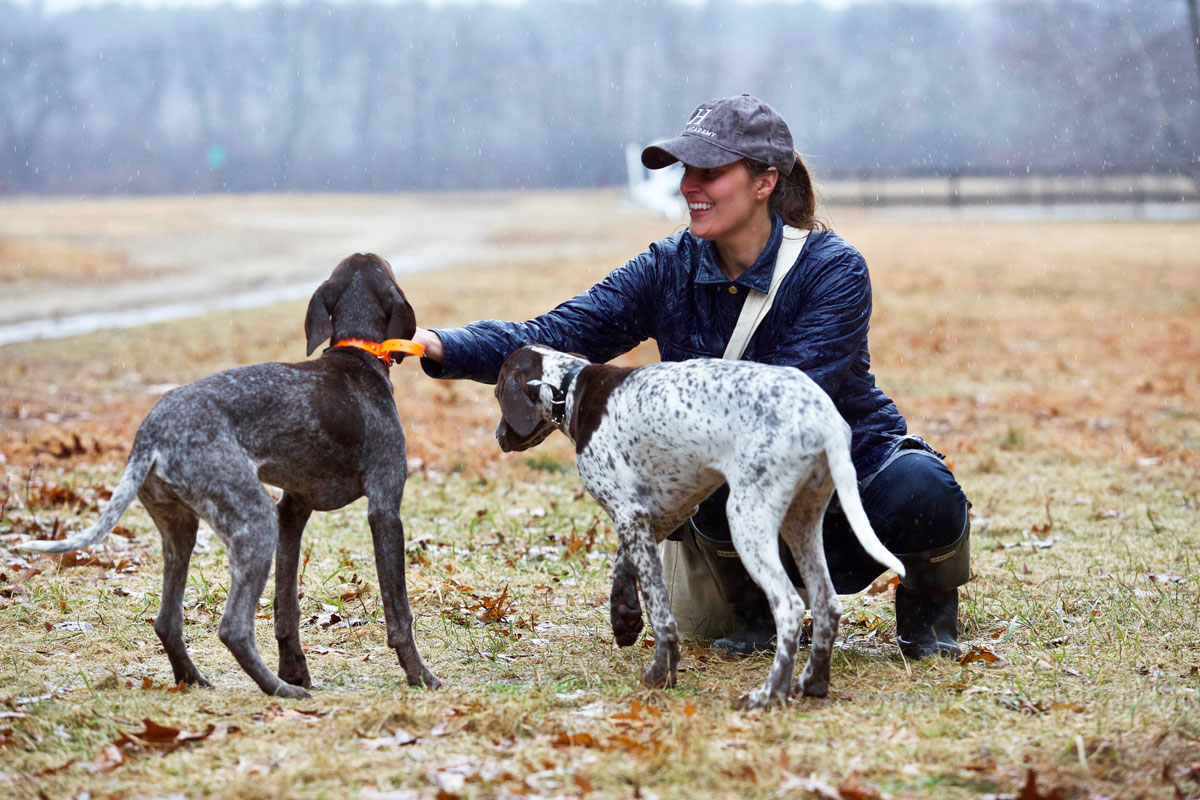
As you may already know, using herbs is more complex than simply picking an herb to address a symptom. As herbalists and animal guardians, it is a natural instinct to want to use herbs to nurture our pets. Herbs can help support animals’ health just as they do for humans.
However, it is important to remember that anxiety, nervousness, fear, occasional aggression, and depression are all normal emotions of every animal’s life (Wulff & Tilford, 2011). Consider the cause of an emotional or behavioral issue before using herbs as a key step in holistic health. When prescribed by or under the guidance of an experienced professional, herbs can help an unwell animal through a combination of actions in the body, including supporting their organ functions, supporting the whole body, and raising the level of wellbeing in the animal over a period of time (Fougere, 2005).
Herbal Safety
Generally speaking, the herbs listed below are regarded as safe for canine use. However, it is important to remember that the difference between a helpful and harmful herb is in the dose — most toxicity problems with herbs in animals occur due to inappropriate dosing and overdosing (Fougere, 2005). It is safest to have the guidance or supervision of a veterinarian or professional trained in administering herbs to animals. When possible, purchase products made specifically for animals, and make sure they have recommended dosages on the label. When using herbs, always begin by using the smallest dose first, then work your way up (Fougere, 2005). Always monitor your pet for adverse reactions to herbs.
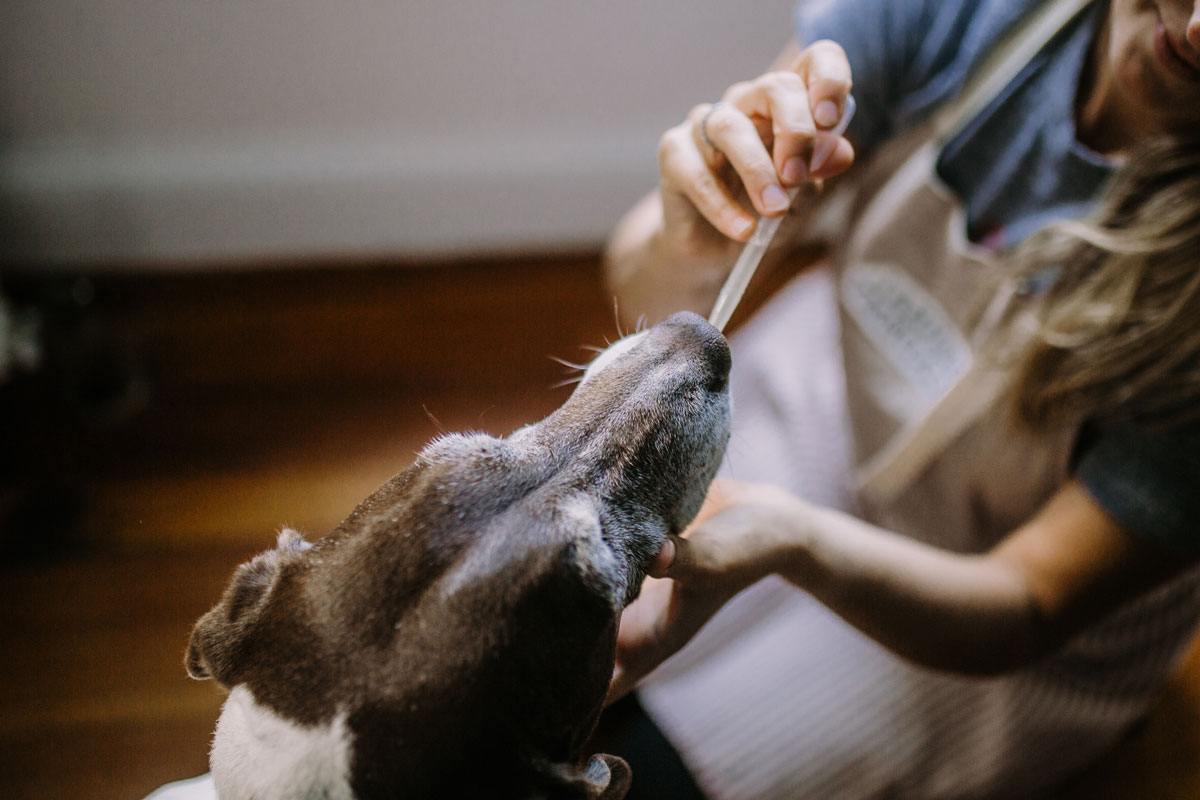
Dosage and Administration
The exact dosage and duration of an herbal plan varies because it depends on the animal’s needs, tolerances, metabolism, age, and body weight. Some animals respond well to small doses, such as one or two drops of tincture, while others may need larger doses, and still others may not respond at all to certain herbs (Wulff & Tilford, 2011). Therefore, a conventional starting point when administering herbs to an animal is to begin with only one or two herbs at a time, and to proportion the dose based on the animal’s body weight compared to the recommended human dosage. If you need to increase the dose, do so in 10% increments, under constant supervision (Wulff & Tilford, 2011).
When using conservative dosage guidelines, alcohol-based herbal extracts that are 30-70% alcohol should not pose any alcohol toxicity issues (Wulff & Tilford, 2011). However, most animals do not like the taste of alcohol tinctures and will refuse to consume them; therefore, it is usually recommended to use glycerites. Alternatively, you can try putting the appropriate dosage of an alcohol tincture in a small amount of boiled water so that the alcohol evaporates, then allow the water to cool and add it to your dog’s food or water bowl.
Chamomile (Matricaria chamomilla) flowers
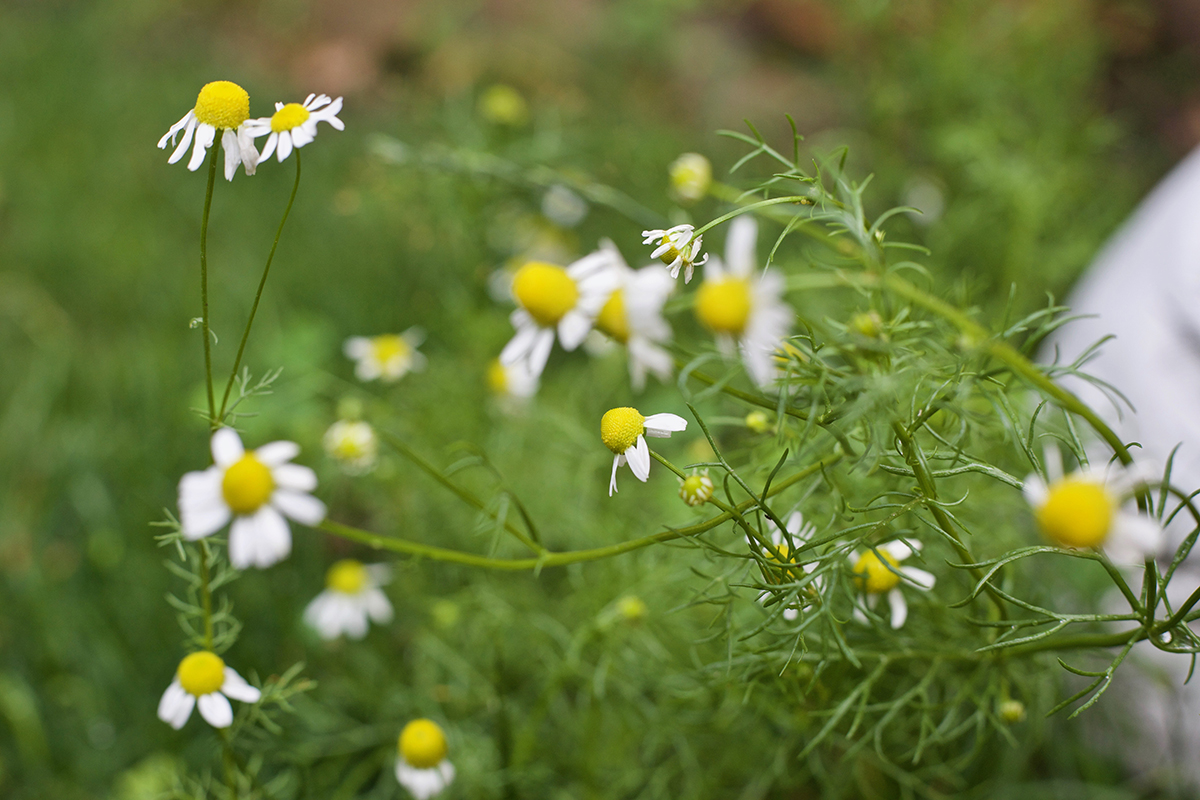
Chamomile is a great calming canine herb because it is considered a gentle and mild sedative (Wulff & Tilford, 2011). It may also help soothe digestive upset which can sometimes be caused by nervousness or hyperactivity (Rive, 2013). Most animals find it pleasing to consume and it is a good herb to try first before reaching for other stronger, less-palatable herbs that can be sedating, like valerian (Rive, 2013).
Suggested Use
- 12-20 drops (0.25 – 0.50 mL) of glycerite or alcohol tincture per 20 pounds of the animal’s body weight, no more than twice daily, as needed in your dog’s mouth or water bowl (Wulff & Tilford, 2011).
- Pour 1 cup of boiling water over 2 teaspoons of chamomile flowers, infuse for 5 minutes and then pour over a cheesecloth-lined bowl to separate the liquid from the plant material (Fougere, 2005). Add the cooled chamomile tea to the dog’s water bowl or food, twice daily or as needed.
Cautions
Like humans, some animals may be allergic to this plant (Wulff & Tilford, 2011). You can test the sensitivity of your pet by placing a small amount of tea, glycerite, or tincture on their skin. If there is no allergic reaction, you may administer one or two drops orally. If there continues to be no reaction, you may slowly increase the dose (Wulff & Tilford, 2011).
In addition, chamomile is not recommended for pregnant pups (Rive, 2013). If your pet is currently pregnant or taking prescription medications, make sure to consult your veterinarian before administering herbs.
Catnip (Nepeta cataria) aerial parts
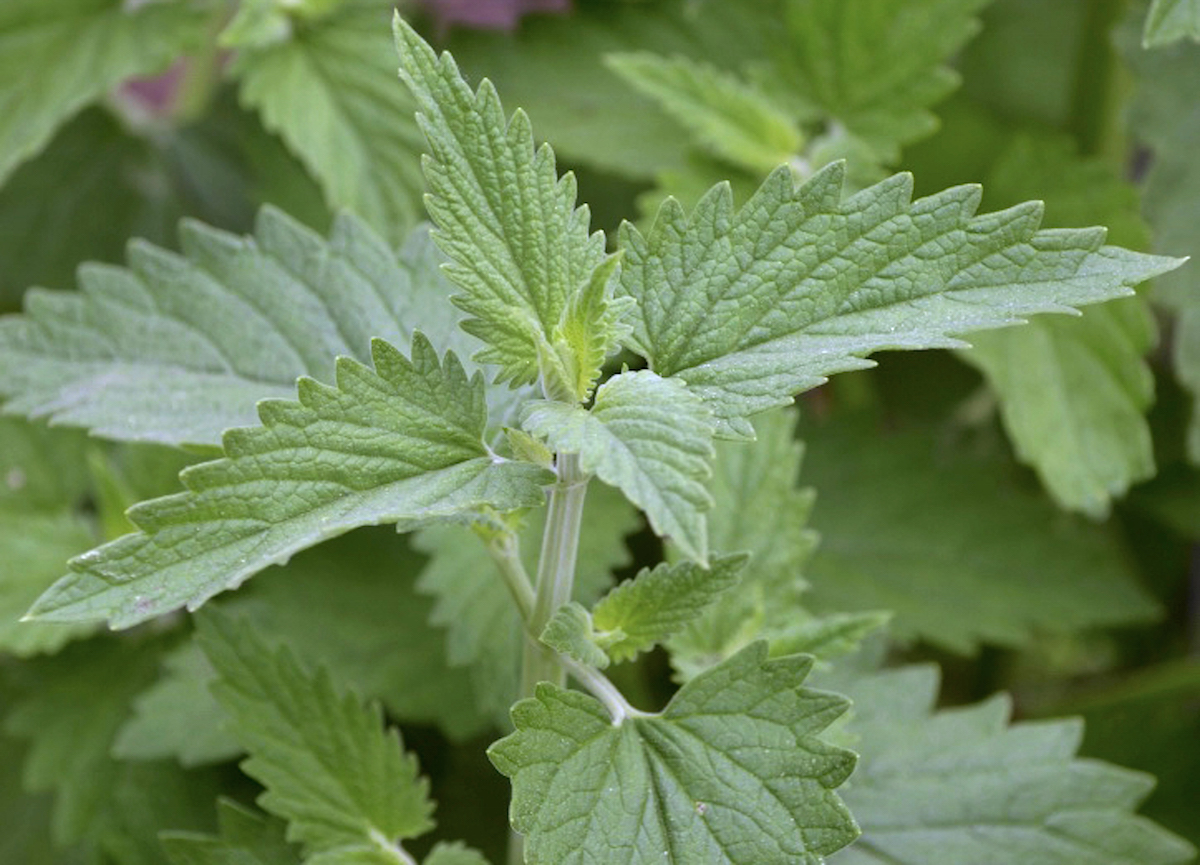
Typically catnip is not believed to be calming due to one of its compounds, nepetalactone, that can really stimulate some cats! (Wulff & Tilford, 2011). About 60% of cats become hyperactive after being introduced to this plant (Fougere, 2005). However, for most dogs it has the opposite effect. Catnip is considered a calming canine herb and mild sedative that can help soothe an animal’s anxiety and may even promote a more restful sleep (Wulff & Tilford, 2011). Catnip is also an anti-spasmodic and may help relieve an animal’s upset stomach or vomiting due to anxiety (Wulff & Tilford, 2011).
Suggested Use
- 12-20 drops (0.25 – 0.50 mL) of glycerite or alcohol tincture per 20 pounds of the animal’s body weight, ideally 10-20 minutes before a stressful situation (Wulff & Tilford, 2011), no more than two or three times daily, as needed, in your pet’s mouth or water bowl.
- You may try placing 3 or 4 fresh leaves in their water bowl with 8 oz or more of water.
Caution
Catnip consumption is not recommended for pregnant animals (Wulff & Tilford, 2011). If your pet is currently pregnant or taking prescription medications, make sure to consult your veterinarian before administering herbs.
Skullcap (Scutellaria lateriflora) leaves
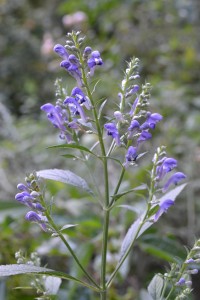
Skullcap can be a great calming canine herb and is often regarded as an effective nervine for general nervousness, excitability, and oversensitivity. It can also help soothe nervous tension related to pain or trauma (Wulff & Tilford, 2011). It can also renew and revitalize the central nervous system (Hoffmann, 1991).
Skullcap seems to induce a moderate reaction, not necessarily mild, but also not sedating, and generally does not seem to produce drowsiness or dull reflexes in animals when consumed (Wulff & Tilford, 2011). This makes skullcap a great herb to try if other milder herbs are ineffective, but the animal still needs to be awake and able to respond normally.
Suggested Use
- 20 drops (0.50 mL) of glycerite or alcohol tincture per 20 pounds of the animal’s body weight as needed, up to 3 times daily for up to 1 week (Wulff & Tilford, 2011), in your pet’s mouth or water bowl.
Caution
None noted. If your pet is currently pregnant or taking prescription medications, make sure to consult your veterinarian before administering herbs. . Valerian root has often been traditionally used for pain relief, especially when pain is a
Valerian (Valeriana officinalis) root
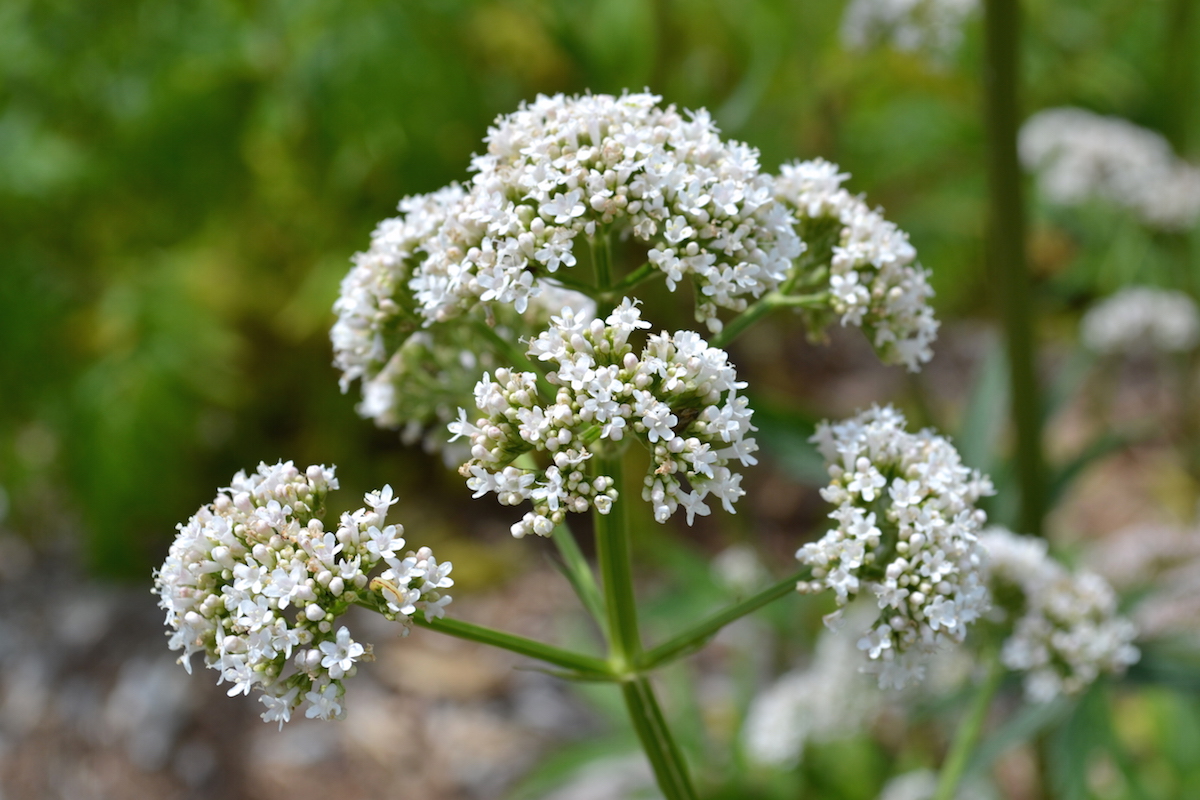
Valerian is a calming canine herb and is commonly regarded as an herbal sedative. The root may help gently soothe nerves and anxiety and can encourage physical relaxation, even when pain is present (Wulff & Tilford, 2011)ssociated with tension. It may also help soothe overexcitability and periods of panic (Hoffmann, 1991).
Valerian can be very helpful in calming dogs during stressful situations, especially if administered several hours or even days beforehand. Valerian is believed to be most effective when consumed in small doses several times daily over a period of several days (Wulff & Tilford, 2011). It can be quite strong for some individuals, so it is best to use this plant only if milder calming canine herbs have already been tried and found ineffective.
Suggested Use
- 5 drops (0.13 mL) of glycerite or low-alcohol tincture, 3-4 times a day, preferably starting 3 days before a known stressful event (Wulff & Tilford, 2011), in your pet’s mouth or water bowl.
Caution
A small percentage of animals have the opposite reaction when consuming valerian, in that it is stimulating and not sedating (Wulff & Tilford, 2011). If this happens to your pet, discontinue use. This herb should be administered in very small doses. Valerian can cause digestive upset in some animals when used in large doses. Valerian should not be used in pregnant animals (Wulff & Tilford, 2011). If your pet is taking prescription medications, make sure to consult your veterinarian before administering herbs.
Herbs for Canine Nervine Health
Animals feel a normal, healthy, and wide range of emotions, just like humans. Getting to know an animals’ triggers for stressful situations is a great first step in helping them achieve balance holistically. Calming canine herbs like chamomile, catnip, skullcap, and valerian can help soothe and nourish your pet’s nervous system. With patience, practice, and the new herbal knowledge you just gained, you may soon be able to support your canine friend with calming herbal care, hopefully before, or during, the next stressful event that crosses your pet’s path.
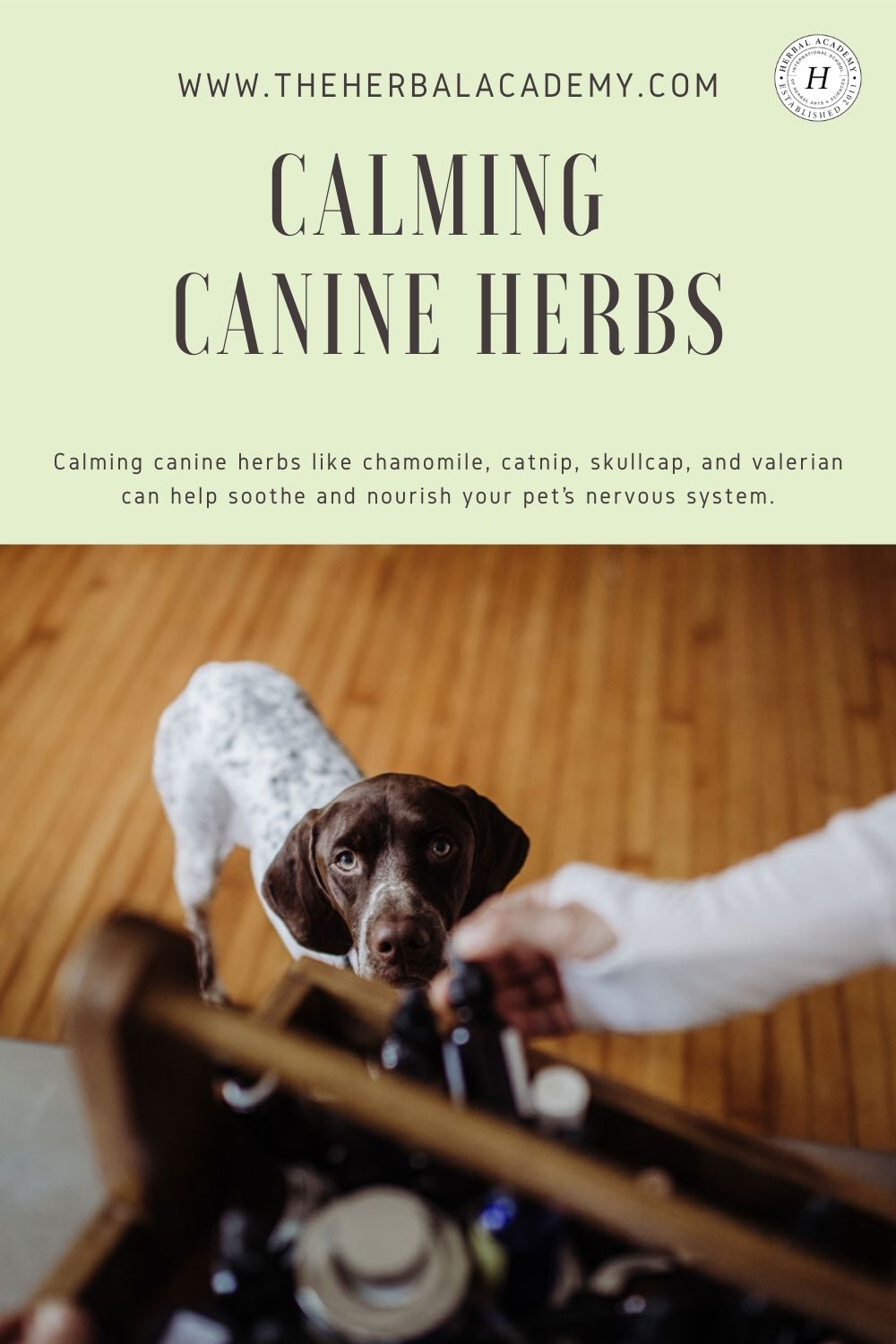
REFERENCES
Fougere, B. (2005). Pet lover’s guide to natural healing for cats and dogs. St. Louis, MO: Elsevier Saunders.
Hoffmann, D. (1991). An herbal guide to stress relief. Rochester, VT: Healing Arts Press.
Rive, J. (2013). 37 herbs & remedies for fabulously healthy animals. Auckland, NZ: Brookby Herbs.
Wulff, M., & Tilford, G. (2011). Herbs for pets: The natural way to enhance your pet’s life. Irvine, CA: I-5 Publishing.








